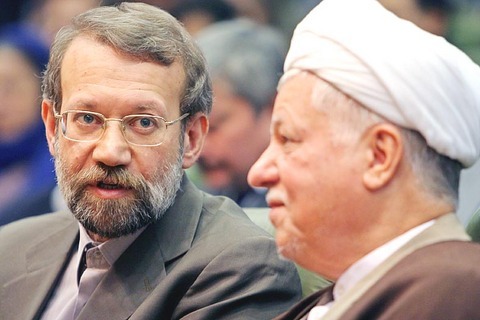With Russia and China opposed to sanctions against Iran, the West wants to ratchet up pressure bit by bit in the UN Security Council next week in a bid to curb Tehran's nuclear ambitions.
But China and Russia are contemplating a meeting of the 35-nation board of the International Atomic Energy Agency (IAEA) before any UN consideration of a report due by Friday from IAEA director Mohammed ElBaradei.
"There are proposals that the IAEA board of directors should have a meeting first before the council takes it up," China's UN ambassador, Wang Guangya (

PHOTO: AP
In Berlin, a European diplomat, speaking on condition of anonymity, said Russia and China wanted to emphasize the primacy of the Vienna-based IAEA board.
The envoy, who was not authorized to speak to reporters, said the aim was to delay UN action until after an IAEA board meeting in June to slow down any US drive for sanctions.
In Tehran, an Iranian official said yesterday that the country would halt relations with the UN atomic watchdog if sanctions were imposed and vowed that a military attack would merely send its activities underground.
The Islamic regime's national security chief Ali Larijani also refused to rule out using oil as a weapon in the worsening international standoff, warning of "important consequences" for energy supplies if Iran was subjected to "radical measures."
"If you decide to use sanctions against us, our relations with the agency will be suspended," Larijani said of the IAEA.
The IAEA has been investigating Iran for more than three years, and any cut in ties would spell an end to international inspections and monitoring of nuclear facilities inside the Islamic republic.
"Military action against Iran will not lead to the closure of the program," Larijani said. "If you take harsh measures, we will hide this program. Then you cannot solve the nuclear issue.
"You may inflict a loss on us but you will lose also," he warned.
Iran is the world's fourth largest crude producer and the second-biggest in OPEC.
The US and its allies suspect Iran is trying to build an atomic bomb under cover of a civilian nuclear program. Tehran says its program is for energy purposes only.
The Security Council passed a statement last month asking ElBaradei to report simultaneously to the council and the IAEA board by April 28 on whether Iran has halted enriching uranium, a process that can produce fuel for nuclear warheads.
As a first step, Western powers want a council resolution that would turn demands made in last month's statement into a legally binding measure under the Chapter 7 provision of the UN Charter. The council's statement, which also asks Iran to answer outstanding questions on its program, was based on earlier resolutions by the IAEA board.
"Our expectation would be -- assuming no change of direction by Iran, and there is no reason to think there will be a change of direction -- that we will look at a Chapter 7 resolution to make mandatory all of the existing IAEA resolutions," US Ambassador John Bolton said on Monday.
"We are going to wait for the April 28 report. We are in consultations now and will be this week on the timing and the handling of the resolution," Bolton said.

VAGUE: The criteria of the amnesty remain unclear, but it would cover political violence from 1999 to today, and those convicted of murder or drug trafficking would not qualify Venezuelan Acting President Delcy Rodriguez on Friday announced an amnesty bill that could lead to the release of hundreds of prisoners, including opposition leaders, journalists and human rights activists detained for political reasons. The measure had long been sought by the US-backed opposition. It is the latest concession Rodriguez has made since taking the reins of the country on Jan. 3 after the brazen seizure of then-Venezuelan president Nicolas Maduro. Rodriguez told a gathering of justices, magistrates, ministers, military brass and other government leaders that the ruling party-controlled Venezuelan National Assembly would take up the bill with urgency. Rodriguez also announced the shutdown

Civil society leaders and members of a left-wing coalition yesterday filed impeachment complaints against Philippine Vice President Sara Duterte, restarting a process sidelined by the Supreme Court last year. Both cases accuse Duterte of misusing public funds during her term as education secretary, while one revives allegations that she threatened to assassinate former ally Philippine President Ferdinand Marcos Jr. The filings come on the same day that a committee in the House of Representatives was to begin hearings into impeachment complaints against Marcos, accused of corruption tied to a spiraling scandal over bogus flood control projects. Under the constitution, an impeachment by the

Exiled Tibetans began a unique global election yesterday for a government representing a homeland many have never seen, as part of a democratic exercise voters say carries great weight. From red-robed Buddhist monks in the snowy Himalayas, to political exiles in megacities across South Asia, to refugees in Australia, Europe and North America, voting takes place in 27 countries — but not China. “Elections ... show that the struggle for Tibet’s freedom and independence continues from generation to generation,” said candidate Gyaltsen Chokye, 33, who is based in the Indian hill-town of Dharamsala, headquarters of the government-in-exile, the Central Tibetan Administration (CTA). It

China executed 11 people linked to Myanmar criminal gangs, including “key members” of telecom scam operations, state media reported yesterday, as Beijing toughens its response to the sprawling, transnational industry. Fraud compounds where scammers lure Internet users into fake romantic relationships and cryptocurrency investments have flourished across Southeast Asia, including in Myanmar. Initially largely targeting Chinese speakers, the criminal groups behind the compounds have expanded operations into multiple languages to steal from victims around the world. Those conducting the scams are sometimes willing con artists, and other times trafficked foreign nationals forced to work. In the past few years, Beijing has stepped up cooperation